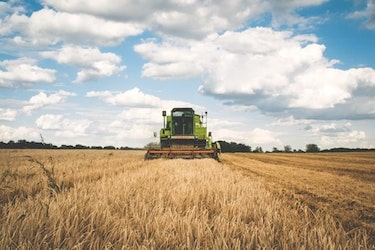
Agriculture is arguably the most crucial industry in the world. With an online agriculture degree, you’ll have the skills needed to contribute to this vital sector. Some of the top jobs in this industry include agricultural scientists, agribusiness managers, and agricultural engineers. This field is about far more than just fields. Find out more below!
ARTICLE NAVIGATION:
- Online Agriculture Degrees: Diploma | Certificate | Associate | Bachelor’s | Bachelor Completion | Graduate Certificate | Master’s | Doctorate
- Accreditation for Online Agriculture Degrees
- Can an Online Agriculture Degree Meet Licensing or Certification Requirements?
- Licensure and Certification for Agriculture Careers
- Career Outlook with an Online Agriculture Degree
- Expected Salary with an Online Degree in Agriculture
Online Agriculture Degree Programs: The Different Levels
Diploma
Diplomas provide basic skills for entry-level careers in the agriculture industry. These programs cover a variety of subjects that are key to food production, farming, and agricultural businesses.
Some are designed for work in a specific type of agriculture. For example, the Viticulture Diploma from Central Lakes College is for students who want to work in the wine business. In fact, it will train them to become managers of vineyards.
GetEducated's Picks
- Lakeshore Technical College Agriculture Technician Technical Diploma
- Central Lakes College Enology Diploma
- Central Lakes College Viticulture Diploma
Certificate
Certificates can be used to start or improve an agricultural career. Chiefly, people working in the industry can enhance their knowledge and skills with a certificate.
Agriculture certificates cover a wide variety of subjects. Choose from programs that cover issues like agribusiness management, environmental law, turfgrass management, and equine business management.
GetEducated's Picks
- North Carolina State University at Raleigh Certificate in Agricultural Business Management
- Northeast Iowa Community College Certificate in Agriculture Finance / Agriculture Business
- South Dakota State University Certificate in Agricultural & Environmental Law (Great Plains IDEA)
Associate
High school graduates who want a two-year path to a career should consider an associate-level online agriculture degree. These educations, which can be completed online, can lead to many careers. For example, an associate’s degree is the minimum for a career as an agricultural tech.
An associate’s degree requires at least 60 credit hours and usually takes two years to complete. Part-time students may need three or more years to finish. There are many choices for students. Some options are equine training and viticulture. Most, however, focus on the business side of agriculture. Options include agribusiness, finance, and management.
GetEducated's Picks
- East Mississippi Community College Associate of Arts (AA) - Agricultural Science Emphasis
- East Mississippi Community College Associate of Arts (AA) - Horticulture Emphasis
- East Mississippi Community College Associate of Arts (AA) - Animal Science Emphasis
Bachelor’s
To become an agricultural scientist, a bachelor’s degree in agriculture science is the perfect choice. These online agriculture degrees give students a strong background in crop and soil science, biology, chemistry, and other key topics.
Some online agriculture degree programs focus on the science aspect of the field. Others specialize in leadership and management, focusing on topics like agribusiness. There are even business administration degrees that focus on the agriculture sector.
A bachelor’s degree in agriculture can be completed entirely online and will require at least four years of study. Tuition for accredited online agriculture bachelor’s degrees ranges from about $27,000 to $92,000. Once complete, graduates will be prepared for work as an agriculture scientist or manager.
GetEducated's Picks
- University of West Alabama Bachelor of Business Administration / Agri-Business
- Southwest Minnesota State University Bachelor of Science in Agribusiness Management
- Arizona State University Bachelor of Science in Sustainable Food Systems
Bachelor Completion
If you have completed an associate’s degree or have some college experience, you may qualify for a bachelor completion degree. With these online agriculture degrees, students can apply their associate’s education or previous college courses to a bachelor’s. Thus, you can finish a four-year degree in less time, without starting over from the beginning.
Exactly how long it takes to complete these degrees online ag degrees depends on your past education and what credits will transfer. The number of credits you need to complete your degree will also affect your total cost of tuition. Obtain transcripts and speak with the college’s admissions office for details.
These courses can be completed entirely online. They focus on either the science or business issues of the industry. Graduates of these agriculture degrees online are qualified for careers in agriculture management or agricultural science depending on their area of study.
GetEducated's Picks
- Texas Tech University Bachelor of Science in Plant & Soil Science / Horticulture
- University of Nebraska-Lincoln Bachelor of Science in Applied Science
- Kansas State University Bachelor of Science in Food Science & Industry / Food Business & Operations Management
Graduate Certificate
These degrees, available online, are for those with a bachelor’s degree in agriculture or a similar field. They build your knowledge in a specific topic. For example, Penn State offers a Graduate Certificate in Agricultural Biosecurity & Food Defense. This online agriculture program is geared towards homeland security and protecting the food supply from natural and man-made threats.
GetEducated's Picks
- Michigan State University Graduate Certificate in Food Safety
- Iowa State University Graduate Certificate in Agronomy
- North Carolina State University at Raleigh Graduate Certificate in Advanced Horticulture (Great Plains IDEA)
Master’s
A master’s-level online agriculture degree can take many forms. They all require a bachelor’s degree, but can cover topics like business, science, or education. Some, such as the Master of Agriculture in Crop, Soil & Environmental Sciences from Auburn, are about the science of food production. Others focus on the business or financial sides. The Master of Science in Agricultural Economics from Purdue, for example, covers trade, production, and policy issues.
While most are 100% online, some of these degrees require some in-person sessions. The online agriculture degree program from Purdue, for example, has an in-person component.
The most cost-effective online agriculture degree is the Master of Science in Agricultural Education from North Carolina A&T. The total cost is about $7,500. It’s important to note that this is the in-state tuition rate. Students living outside of North Carolina may have higher costs. Other accredited online master’s degrees in agriculture range up to $55,500.
These online agriculture degrees prepare students for a variety of careers, including agricultural teaching or co-op extensions.
GetEducated's Picks
- Northwest Missouri State University Master of Business Administration - Agricultural Economics
- Arizona State University Master of Science in Regulatory Science - Food Safety
- Arkansas State University Master of Business Administration / Agricultural Business
Post-Graduate Certificate
A post-graduate certificate is for those who have a master’s degree and want to build new skills and knowledge in a specific topic. They focus on a niche within the agricultural sector. The Education Specialist in Agriscience Education, for example, creates agriscience teachers.
The program from Auburn University is available 100% online and requires 30 credit hours to complete. This includes 12 hours in the teaching field and 18 hours of professional studies.
Doctorate
With a doctorate, you’ll be one of the most educated experts in agriculture. These online agriculture degrees prepare you for advanced careers in the complex science of food and plant production. One example is the topic of plant breeding, which is the focus of Texas A&M’s Ph.D. program. This degree encompasses 21 credit hours, with a total tuition cost of around $34,500.
While additional education or training may be required, a doctorate in agriculture can help you get a job as a biochemist or medical scientist. Both of these careers require a doctorate based in science.
GetEducated's Picks
- Texas A&M University Doctor of Philosophy in Plant Breeding
- Mississippi State University Doctor of Philosophy in Plant & Soil Sciences / Agronomy
- Mississippi State University Doctor of Philosophy in Plant & Soil Sciences / Horticulture
Accreditation for Online Agriculture Degrees
Accreditation is the process of verifying that a school and program meet quality standards. Schools receive institutional accreditation from regional bodies like the Southern Association of Colleges and Schools Commission on Colleges (SACSCOC) or Middle States Commission on Higher Education (MSCHE).
Individual majors receive programmatic accreditation from groups that concentrate on a specific academic discipline, industry, or subject.
There is no one accrediting body that oversees all of the top online agriculture degree programs. Accreditation for agriculture is complex because these degrees cover so many topics. Degrees approach the industry from many directions. There are science degrees, business degrees, teaching degrees, and engineering degrees. Each discipline has its own accrediting body.
There are, however, some programmatic accrediting bodies that can be found for online ag degrees. The American Society of Agriculture and Biological Engineers, for example, accredits engineering degrees within the agricultural sector. This group is part of the Accreditation Board for Engineering and Technology (ABET.)
Some of the programs are for future agriculture educators. Accreditation for these online agriculture degrees comes from the Council for the Accreditation of Educator Preparation (CAEP). Auburn’s graduate and post-graduate certificates in agricultural education, for example, have CAEP approval.
The Society of American Foresters (SAF) is another group that may accredit agriculture-based degrees.
Resources:
- American Society of Agricultural and Biological Engineers
- Council for the Accreditation of Educator Preparation
- Society of American Foresters
Can an Online Agriculture Degree Meet Licensing or Certification Requirements?
Yes, when needed, these careers can meet licensing requirements. For example, to become licensed as a soil scientist, you need a science or ag degree from an accredited school. As long as the school is accredited, the degree will meet the requirements. All the degrees in our database have school accreditation, so graduates of these agriculture programs online will qualify for licensing.
Licensure and Certification for Agriculture Careers
Very few of the careers that come from an online ag degree require licensing. Optional industry certification, however, can boost most careers.
Certification for agricultural and food scientists depends on the area. Workers can be certified through the American Society of Agronomy or the American Registry of Professional Animal Scientists. For example, a graduate of an online agriculture degree with two years of experience can apply to become a Certified Crop Advisor. Certified Professional Soil Scientist is another title offered by this group.
Soil scientists need licensing in certain states. According to the Soil Science Society of America, 10 states require licensing:
- Maine
- Minnesota
- New Hampshire
- North Carolina
- North Dakota
- South Carolina
- Tennessee
- Texas
- Virginia
- Wisconsin
To better understand licensing, let’s look at the process for Tennessee:
- Graduate from an accredited school with a bachelor’s or higher in soil, agronomy, or a similar field.
- Obtain three years of work experience.
- Submit an application along with your college transcripts and employment information to apply for a license.
- Pay fees of $300 for the application and $100 for the license.
- To renew the license, download a renewal application and fill out the continuing education report form. There is a fee of $400 for renewal as well.
Resources:
- Tennessee - Soil Scientist Licensing
- BLS - Agricultural and Food Scientists
- Soil Science Society of America
Careers with an Online Agriculture Degree
Although growth for these careers will not be strong, they will be above average. The agricultural scientist career is expected to grow by 8% between 2021 and 2031, which is above the national rate of 5%. However, the total numbers are relatively small. There will only be 40,200 total agriculture scientists by 2031. For perspective, there are about 833,000 lawyers in the U.S.
Ag techs will see similar results. The expected growth for this career is 9%, but there will only be about 34,400 total by the end of 2031.
There are far more farmers, ranchers, and ag managers, but their numbers are expected to decrease. In 2021, there were 847,600 people in these jobs. Due to increased efficiencies and technology, experts expect this to drop by 3% by 2031. This will result in about 824,000 farmers, ranchers, and managers in the future.
Resources:
- BLS - Agricultural and Food Scientists
- BLS - Agricultural and Food Science Technicians
- BLS - Farmers, Ranchers, and Other Agricultural Managers
Expected Salary with an Online Agriculture Degree
Agriculture careers can bring strong salaries. More specifically, here are the median salaries for professions related to agriculture science and agribusiness:
- Agricultural engineers: $82,640
- Agricultural scientists: $74,160
- Farmers, ranchers, and managers: $73,060
- Agricultural and food science technicians: $44,700
While these salaries are strong, there is a chance for even higher earnings. For example, the top 10% of agriculture scientists earned over $128,160 per year.
The highest earnings are found in the western and mountain regions of the country. The top state for a soil scientist is Nevada, where the median salary is $107,720. On the other hand, California is the top area for animal scientists, who earn a median of $177,430. For food scientists, Colorado brings the best incomes with a median salary of $103,520.
Resources:
- BLS - Employment of Soil and Plant Scientists
- BLS - Employment of Animal Scientists
- BLS - Employment of Food Scientists and Technologists
Start a World-Class Career with an Online Agriculture Degree
The agriculture sector needs hard-working, dedicated experts like you! With an online agriculture degree, you will be able to contribute to this key industry.






